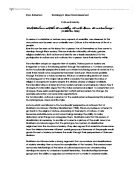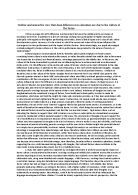Another idea about classes has been presented by Karl Marx, whose theory was very popular in 1970s because it was simple to understand and his theory gave people answers, which were not given by functionalists. Karl Marx saw that all societies were class societies, which means that one part owned and controlled material resources (bourgeoisie), while another owned nothing (working class). For instance, in feudal society lords owned land, and exploit workers, who didn`t own anything. As a result, there was basic conflict between two classes.
The extent of inequality between the value of the goods and services produced by workers and the wages paid for them is lies at the core of the huge profit made by the capitalists. For instance, according to HM Revenue and Customs, in 2003, 71% of all financial wealth was owned by 10% of the population. Marxists believed that those who regulate the economy also control all the cultural institutions such as family, media, religion and education. They thought that the function of these cultural institutions is to keep up class inequality and influence on human identity and culture. This plan and ideological device were so successful that the majority of working class believed that their position in society is deserved. Through ideology capitalist shaped the way of life of an identity. For instance TV, cinema and music advertise us that to buy more and more material goods, which would make us happier.
This means that most of people are not suspecting about their real identity. Marxists determined it as false class consciousness. They believed, that working class will find the real truth and fight for their rights against capitalist system.
Max Weber was another sociologist who took a conflict perspective. Weber agreed with Marx that social class was main source of unfairness between people of different classes, but Weber argued and thought that status more important than class. For example injustice between White and Black in South Africa, 1950s: poor White had more power and status, than educated and successful Black. Weber thought that people from the same status group share a similar lifestyle and identity.
For feminists the basic source of inequalities and conflicts is gender. They believe that even today the UK is patriarchal society, where men have more power and status than women. Despite of it, nowadays women are more prosperous and forceful, than they were some years ago. For example, nowadays women could decide whether to have children or not, women could work the same jobs as men.
Another important idea about social classes was explained by postmodernists. They thought that future problems could be solved by power of science and that class and gender don`t affect human`s identity and culture. (Haralambos, 2007:p891) Nowadays, thanks to the money and globalization, identities are no longer reducible simply to the social groups to which people belong. For instance people have a great deal of choice about what social groups to join, shopping, surgery and other forms of consumption help people easily change their identity. For example Michael Jackson who changed his identity from Afro-American to white American. It means that people could make their own decisions what society, lifestyle or subculture to join. It also means that importance of social class decreasing, but instead of class the role of status increased rapidly. For instance to show status people buy expensive cars and exclusive clothes.
Differences in social classes could influence personal identity, because identity related to social groups to which the identity belongs, for example nationality, culture, ethnicity, sexuality, gender and class. First of all identity is “a sense of self that develops as the child differentiates from parents and family and take a place in society” (Jary and Jary, 1991:p665). Identity also formed through some combinations of individual choice and structured group membership (for example in Arab countries Muslim women can`t drive the car).
In additional, people could express their aspects of identity in a different way. For example clothing, which clothes choose to wear to show gender, post - modernism or class; language, which words to use when people speak with fiends to show class, educational background and gender. It is goes without saying that even though ‘class’ no longer exists, but we could easily identify person`s class, status and possessions from their clothing and way of behaving.
The principle of the identity is closely linked to the idea of culture. As I have already mentioned identities could also be formed through the cultures to which people belong to. “Culture is the language, beliefs, values and norms, customs, dress, diet, roles, knowledge and skills which make up ‘the way of life’ of an individual society ”(Ralph Linton, 1945). For example norms and diet, in the UK at 17 o`clock most people have their couple of tea.
Culture includes teaching and learning such process like socialization. We gain our identity through “socialisation”. Socialisation is the process by which we, as individuals, become members of our society or culture. We are also active participants in this process – we decide what to accept or reject. Process of learning culture or socialization includes family, school, peer, media and religion. For example: family, your parents give you name, first beliefs and tastes; school, teaches person rules and gives knowledge; religion, teach people to appreciate some values; peers, teach person how to socialize; media, gives people ideas about gender, status and class.
Modern sociologists also think that being of a different class may involve differences in culture, economic circumstances, educational status, dietary preferences, housing conditions, property ownership and power. For example, differences in culture, people who are from middle and upper – middle class in free time visit museums and theatres, whereas working class visits pubs.
One of the important factors in people’s culture and identity is social mobility, the ability to move from one class to another. For example, moving from the working to the middle class. Nowadays class, gender, sex, race and kinship have less influence on human identity. It is becoming more important human`s talent, knowledge, ambition and hard – working abilities for achieving a good position in the class system.
World sociology has changed greatly, beginning of the XXI centuries gave to the UK a lot of new. New national socio – economic classifying statistics (NS - SEC), which replaced Registrar Generals classification. New sociologists have another view on dividing society into social classes. For instance class has been defined consisted of eight major classes. The first four is middle class, which include higher managerial and professional occupations, lower, intermediate occupations, small employers and own account workers. The other four is manual workers, including lower supervisory and technical, semi – routine occupations, routine occupations and never worked people.
A big and new tendency had happened in modern Britain: the number of manual workers declines year by year. If for example in 1911 a percentage of manual workers was about 81%, in the year 2000 this percentage twice declined and become about 40% of total workforce. This become possible first of all because of developing new technologies: technique makes most manual work. Secondly because of changing of economical situation such as increasing life standards and education system.
Traditionally social classes have been the main concept for understanding society, its behaviour or social conflicts, and predict the main movements of social behavior. Today`s sociologists in developed countries see classes like a historical phenomenon. The same view on social classes has Pakulski and Waters. They thought that class is no longer important factor in a human identity. According to Pakulski, we could pick out four main features such as cultuaralism, fragmentation, autonomization and resignification. For instance autonomization, which means that today`s people are not told what to do, they do what makes sense to them. For example, British working class is less likely to vote for the British Labour Party than it once was.
To sum up, in this essay we discussed the different aspects of inequalities; we have seen that the UK is one of the most unequal societies. Inequalities of wealth, which means that one tenth of the UK population owns more than seventy percent of total wealth. Inequalities of income are significant, but welfare policy of the government such as taxation does have a huge effect in reducing the incomes between rich and poor.
Finally, because of the government policy and developing new technologies, class has lost its power in the collective sense, however class would still remain fundamental to culture and human







